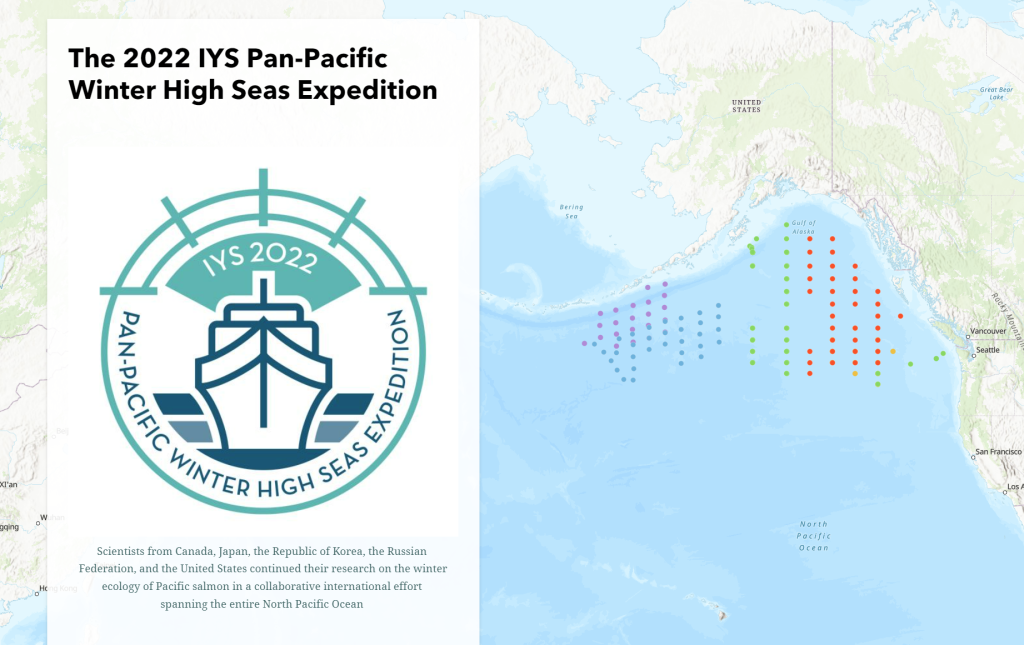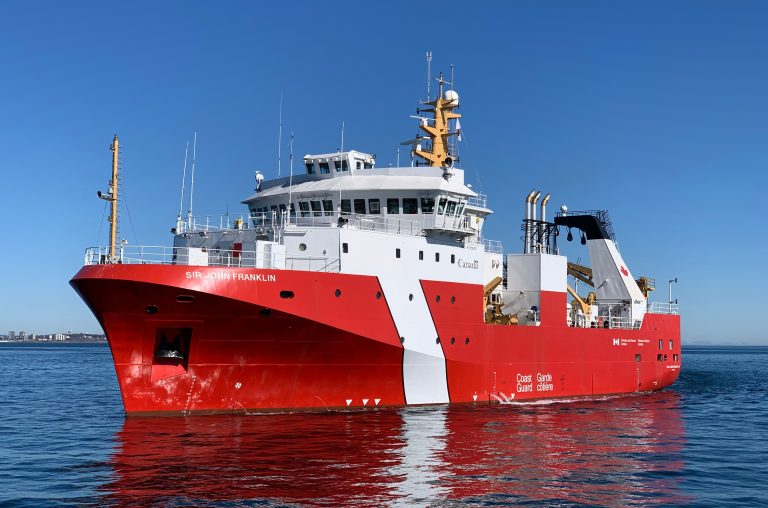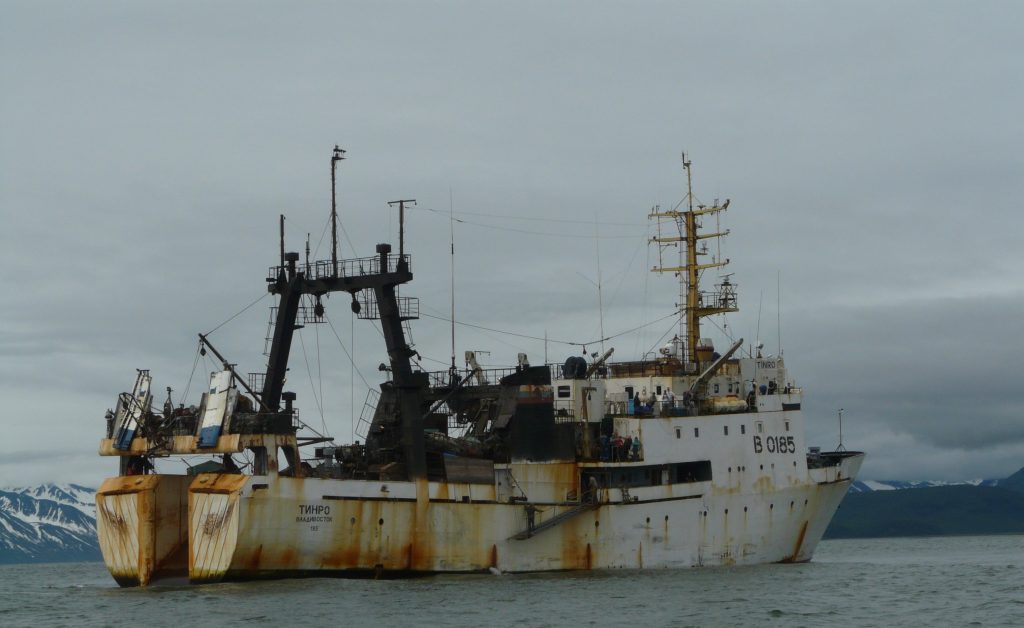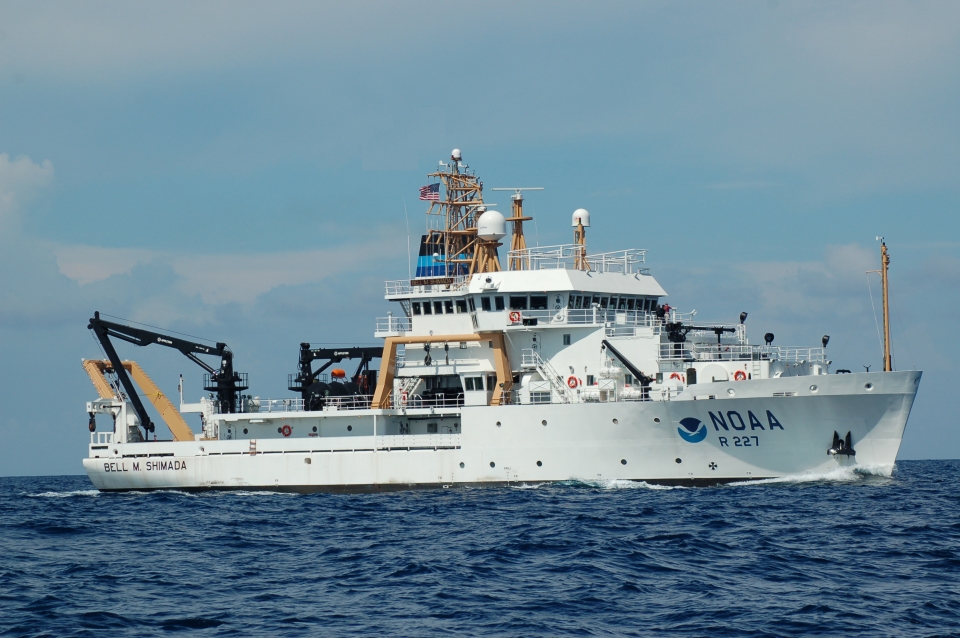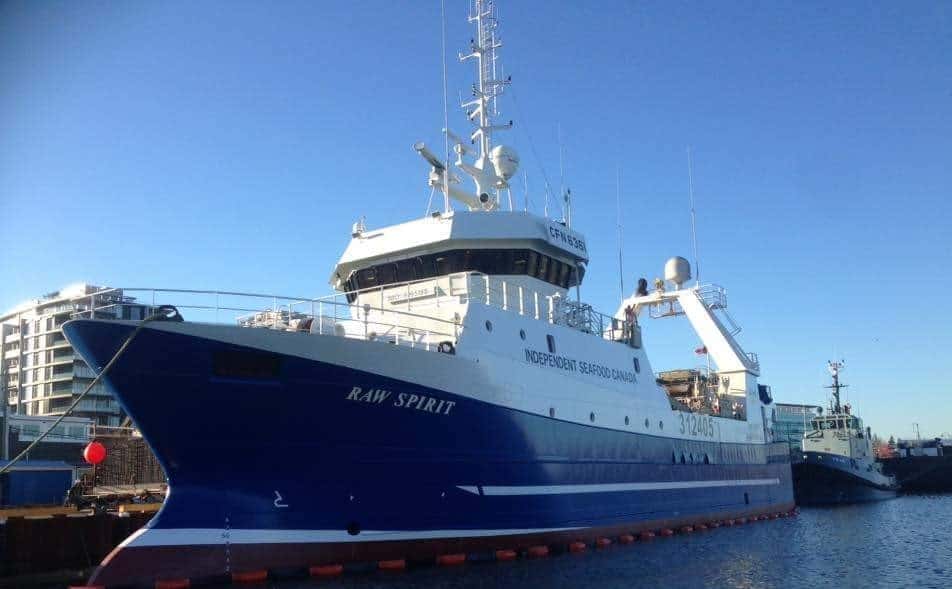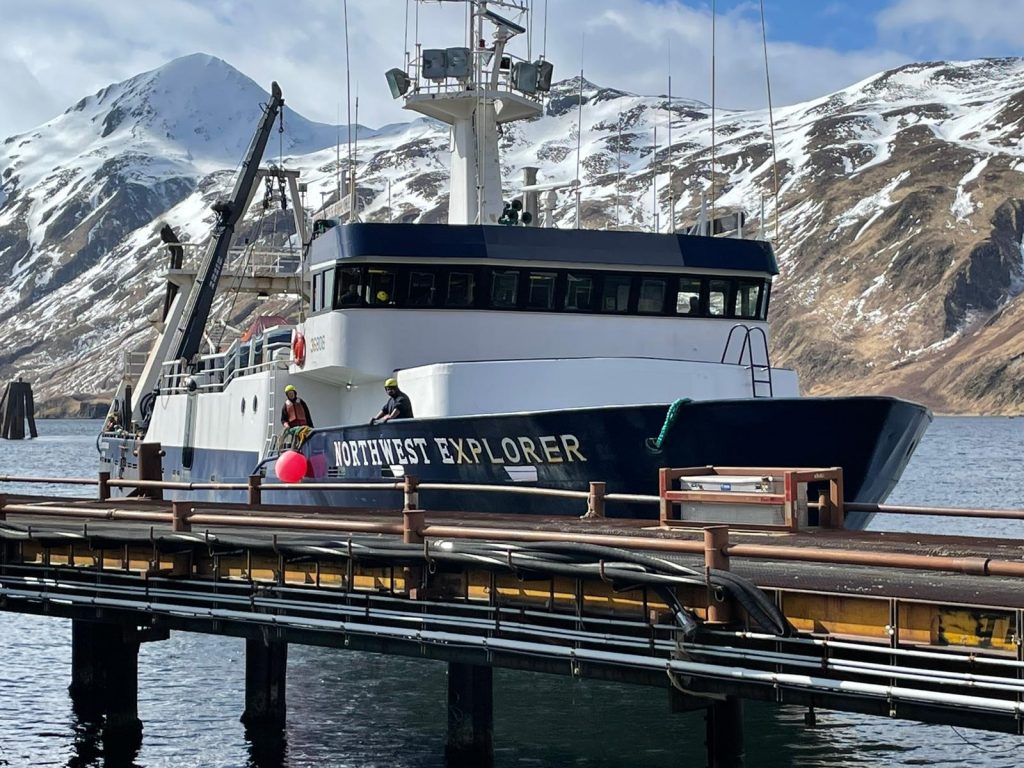2022 Pan-Pacific Winter High Seas Expedition
The largest pan-Pacific research expedition to study the winter ecology of salmon in the North Pacific Ocean
Scientists from Canada, Japan, the Republic of Korea, the Russian Federation, and the United States continued their research on the winter ecology of Pacific salmon in a collaborative international effort spanning the entire North Pacific Ocean
Overview
For decades, the people that depend on salmon have been grappling with a rapidly changing climate which has caused unpredictable changes in salmon productivity across the North Pacific. Due to anthropogenic pressures on ecosystems and associated anomalous events in the North Pacific Ocean, Pacific salmon are progressively being exposed to conditions outside normal climate cycles. Pacific salmon are a uniquely important resource for countries across the North Pacific, but there remain significant gaps in our understanding of the mechanisms that regulate salmon distribution and survival in coastal and especially in high seas environments. Since salmon cross ecosystem and international boundaries as they migrate across the North Pacific, a concerted international effort is imperative to improve our knowledge about the conditions Pacific salmon face in the open ocean. By furthering our understanding of the ocean phase of the salmon life cycle, we can improve our efforts to assess, forecast and manage salmon into the future to build resiliency for salmon and the people that depend on them.
In a major effort to fill our gaps in knowledge, five research vessels went out to sea in late winter 2022 to conduct the largest ever pan-Pacific, epipelagic ecosystem survey during winter, focused on understanding salmon and their ecosystems. The 2022 Expedition involved a full ecosystem survey with pelagic trawling and detailed sampling of marine life in the upper ocean and will include research on physical, biological and chemical oceanography. There was a gillnet vessel deployed in the Gulf of Alaska, alongside the ships that trawled, to test the catch efficiency of different gear types. Novel technologies such as gliders, environmental DNA and genetic stock identification were used to enhance research efforts. The 2022 Expedition brought together scientists from Canada, Japan, the Republic of Korea, the Russian Federation, and the United States — the five member countries of the North Pacific Anadromous Fish Commission (NPAFC) — to build on research from the 2019 & 2020 International Gulf of Alaska Expeditions.
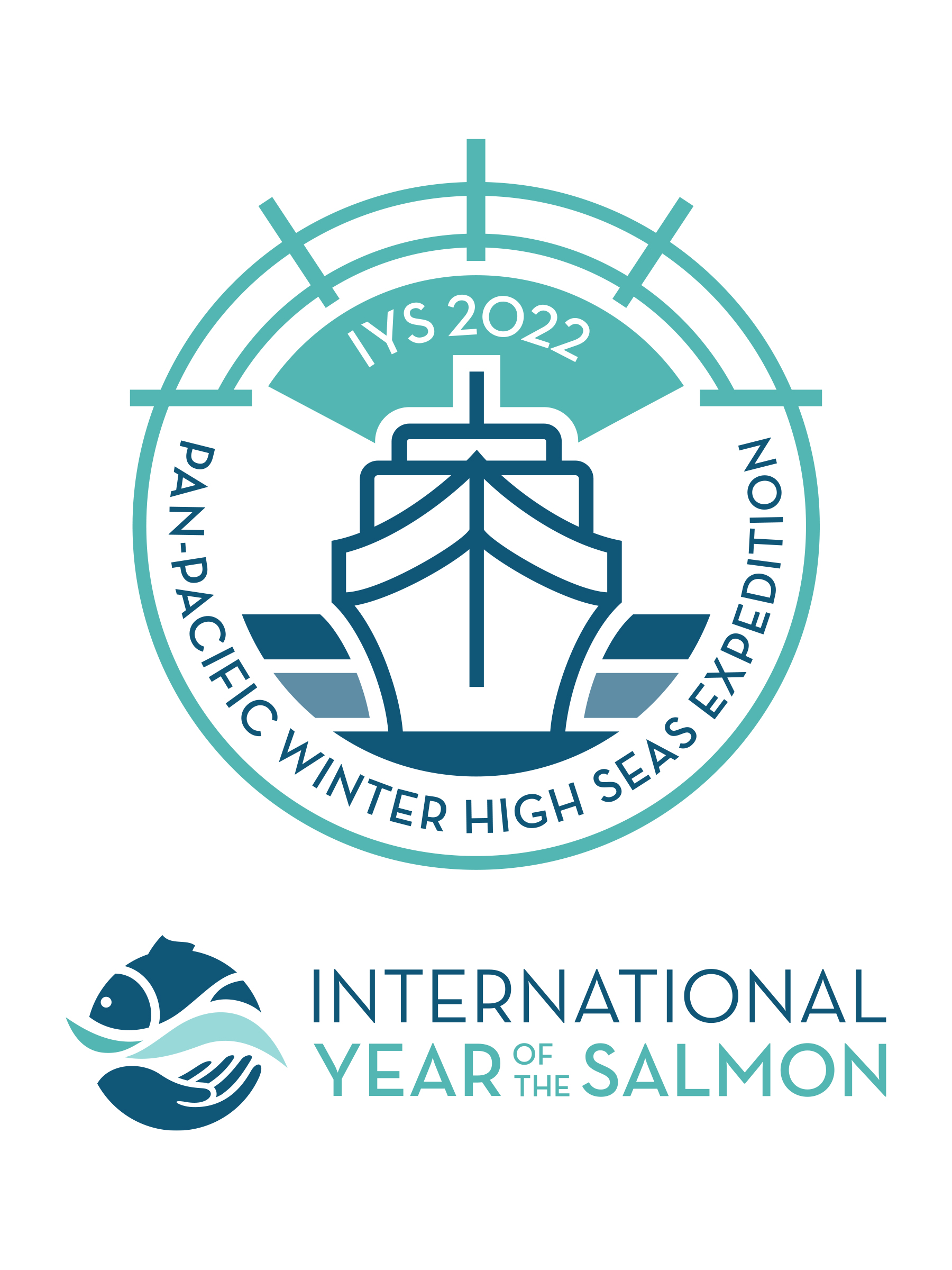
The major objective of the 2022 Expedition was to demonstrate the utility of an international pan-Pacific winter ecosystem survey to understand how increasingly extreme climate variability in the North Pacific Ocean and the associated changes in the physical environment influence the abundance, distribution, migration, growth, fitness and survival of Pacific salmon and surrounding species.
2022 Pan-Pacific Winter High Seas Expedition ArcGIS Story Map
2022 Expedition Results Meeting
The Research Vessels
Click on vessel images to learn more about each vessel!
Country Leads
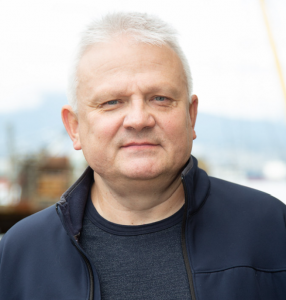 Dr. Evgeny Pakhomov is a Professor at the Department of Earth, Ocean & Atmospheric Sciences and at the Institute for the Oceans and Fisheries at the University of British Columbia in Canada. A graduate of the Russian Academy of Sciences, he has more than 35 years of research experience as a biological oceanographer. His research focuses on understanding physical-biological interactions and ecosystem response to climate change, from the Antarctic to coastal British Columbia and from coastal realms to the high seas. His research interests span species ecology (plankton to fish), ecosystem structure, function and biochemical coupling. Dr. Pakhomov has disseminated his work in more than 250 publications.
Dr. Evgeny Pakhomov is a Professor at the Department of Earth, Ocean & Atmospheric Sciences and at the Institute for the Oceans and Fisheries at the University of British Columbia in Canada. A graduate of the Russian Academy of Sciences, he has more than 35 years of research experience as a biological oceanographer. His research focuses on understanding physical-biological interactions and ecosystem response to climate change, from the Antarctic to coastal British Columbia and from coastal realms to the high seas. His research interests span species ecology (plankton to fish), ecosystem structure, function and biochemical coupling. Dr. Pakhomov has disseminated his work in more than 250 publications.
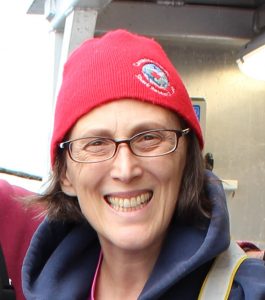 Dr. Jackie King is the Program Head of the Basin and Coastal-scale Interactions program with Fisheries and Oceans Canada. Her research investigates linkages between basin-scale processes and coastal-scale ecosystems including climate forcing, large-scale oceanographic processes, and connectivity in large marine ecosystems. She collaborates in integrative pelagic field studies along the continental shelf, with her primary focus on understanding the factors controlling the abundance, distribution, and production of salmon and associated species in marine ecosystems. She is also the lead for the Canadian Pacific Shark Research Program and responsible for all Canadian Pacific elasmobranch research and conservation.
Dr. Jackie King is the Program Head of the Basin and Coastal-scale Interactions program with Fisheries and Oceans Canada. Her research investigates linkages between basin-scale processes and coastal-scale ecosystems including climate forcing, large-scale oceanographic processes, and connectivity in large marine ecosystems. She collaborates in integrative pelagic field studies along the continental shelf, with her primary focus on understanding the factors controlling the abundance, distribution, and production of salmon and associated species in marine ecosystems. She is also the lead for the Canadian Pacific Shark Research Program and responsible for all Canadian Pacific elasmobranch research and conservation.
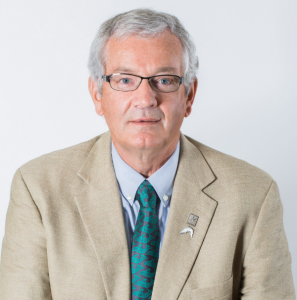 Prior to joining the Pacific Salmon Foundation, Brian worked for 30 years in salmon research and management with Science Branch, Department of Fisheries and Oceans; where he co-authored Canada’s Policy for Conservation of Wild Pacific Salmon (2005), and provided science advice to the Pacific Salmon Treaty. Brian joined the Pacific Salmon Foundation in 2009 as President/CEO. Since joining, he established the Salish Sea Marine Survival Project and the research network (www.marinesurvivalproject.com). Brian retired as CEO/President of PSF on March 31, 2019 and will remain as a Science Advisor through March 2021.
Prior to joining the Pacific Salmon Foundation, Brian worked for 30 years in salmon research and management with Science Branch, Department of Fisheries and Oceans; where he co-authored Canada’s Policy for Conservation of Wild Pacific Salmon (2005), and provided science advice to the Pacific Salmon Treaty. Brian joined the Pacific Salmon Foundation in 2009 as President/CEO. Since joining, he established the Salish Sea Marine Survival Project and the research network (www.marinesurvivalproject.com). Brian retired as CEO/President of PSF on March 31, 2019 and will remain as a Science Advisor through March 2021.
Brian is also a Commissioner for Canada to the Pacific Salmon Commission and has served as a member of the Royal Society of Canada’s Expert Panel on Ocean Climate Change and Marine Biodiversity; was a member of the Province of BC’s Minister of Agriculture’s Advisory Council on Finfish Aquaculture (2018), and mostly joined the Board of Directors for the new Salish Sea Institute, Western Washington University. In 2018, Brian was awarded the Murray Newman Award for Marine Conservation (Vancouver Aquarium), was inducted into the Fraser River Hall of Fame, and received the Larry Rutter Award for contributions to the Pacific Salmon Treaty.
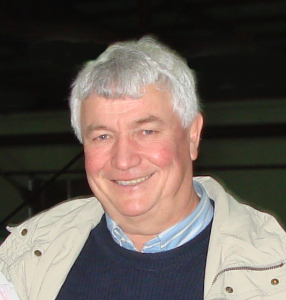 Dr. Richard Beamish, C.M., O.B.C, Ph.D., D.Sc., F.R.S.C. is an Emeritus Scientist at the Pacific Biological Station in Nanaimo, B.C. where he served as Director from 1980-1993. He retired in 2011. Dr. Beamish has the Order of Canada, the Order of British Columbia, is a Fellow of the Royal Society of Canada and received the Nobel Peace Prize in 2007 as a member of the International Panel on Climate Change. He received an Honorary Doctor of Science degree from Vancouver Island University and was recently designated as a Legend in Canadian Fisheries Science by the Canadian Aquatic Resources Section of the American Fisheries Society. He received the American Fisheries Society Award of Excellence in 2017. His research interests have included the discovery of acid rain in North America and recently focus on the factors affecting the abundance of Pacific salmon. He has authored or co-authored a number of papers on the effects of climate on fish populations and was one of the first scientists to write about global warming effects on fishes. He has published over 350 articles including the book “The Sea Among Us- The Amazing Strait of Georgia” that won a British Columbia “Book Prize”. In 2018 he was the Editor and contributor to the 1147 page book “The ocean ecology of Pacific salmon and trout” published by the American Fisheries Society.
Dr. Richard Beamish, C.M., O.B.C, Ph.D., D.Sc., F.R.S.C. is an Emeritus Scientist at the Pacific Biological Station in Nanaimo, B.C. where he served as Director from 1980-1993. He retired in 2011. Dr. Beamish has the Order of Canada, the Order of British Columbia, is a Fellow of the Royal Society of Canada and received the Nobel Peace Prize in 2007 as a member of the International Panel on Climate Change. He received an Honorary Doctor of Science degree from Vancouver Island University and was recently designated as a Legend in Canadian Fisheries Science by the Canadian Aquatic Resources Section of the American Fisheries Society. He received the American Fisheries Society Award of Excellence in 2017. His research interests have included the discovery of acid rain in North America and recently focus on the factors affecting the abundance of Pacific salmon. He has authored or co-authored a number of papers on the effects of climate on fish populations and was one of the first scientists to write about global warming effects on fishes. He has published over 350 articles including the book “The Sea Among Us- The Amazing Strait of Georgia” that won a British Columbia “Book Prize”. In 2018 he was the Editor and contributor to the 1147 page book “The ocean ecology of Pacific salmon and trout” published by the American Fisheries Society.
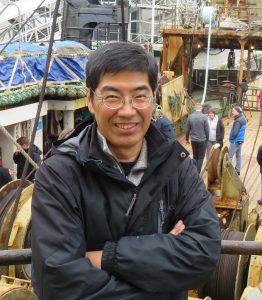 Dr. Hiko Urawa has just retired from the Salmon Research Department, Fisheries Resources Institute, Japan Fisheries Research and Education Agency (FRA), but continues to be involved with NPAFC and FRA as a guest scientist. He had several experiences in high-seas salmon research in the North Pacific Ocean and Bering Sea, including international expeditions in the winters of 1996 and 2019. His research has focused on the distribution and abundance of Japanese chum salmon in the high seas to identify their seasonal migration route and survival mechanisms. He is concerned about how salmon can adapt their specific migration and distribution in the ocean in response to changing environments. He is also interested in the impact of pathogens on the survival of hatchery and wild salmon. He worked for the NPAFC Secretariat as the Deputy Director for 4 years starting in 2006 to coordinate international science activities by member countries. In 2012–2020 he served as the chairperson of NPAFC Science Sub-Committee, whose missions included the draft and review of NPAFC Science Plans and the organization of international workshops/symposia. Hiko received the 2021 NPAFC Award in recognition of his sustained scientific contributions to the NPAFC mission to conserve and manage anadromous salmon in the North Pacific Ocean.
Dr. Hiko Urawa has just retired from the Salmon Research Department, Fisheries Resources Institute, Japan Fisheries Research and Education Agency (FRA), but continues to be involved with NPAFC and FRA as a guest scientist. He had several experiences in high-seas salmon research in the North Pacific Ocean and Bering Sea, including international expeditions in the winters of 1996 and 2019. His research has focused on the distribution and abundance of Japanese chum salmon in the high seas to identify their seasonal migration route and survival mechanisms. He is concerned about how salmon can adapt their specific migration and distribution in the ocean in response to changing environments. He is also interested in the impact of pathogens on the survival of hatchery and wild salmon. He worked for the NPAFC Secretariat as the Deputy Director for 4 years starting in 2006 to coordinate international science activities by member countries. In 2012–2020 he served as the chairperson of NPAFC Science Sub-Committee, whose missions included the draft and review of NPAFC Science Plans and the organization of international workshops/symposia. Hiko received the 2021 NPAFC Award in recognition of his sustained scientific contributions to the NPAFC mission to conserve and manage anadromous salmon in the North Pacific Ocean.
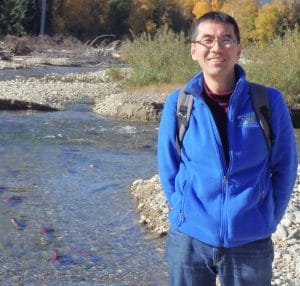 Dr. Shunpei Sato serves as the Head of the Stock Management Group of the Salmon Resources and Ecology Division in the Salmon Research Department at the Fisheries Resources Institute of the Japan Fisheries Research and Education Agency. His interests are 1) the genetic structure of chum and pink salmon populations in Japan and 2) the estimation of stock distribution pattern and stock abundance of chum salmon in the ocean.
Dr. Shunpei Sato serves as the Head of the Stock Management Group of the Salmon Resources and Ecology Division in the Salmon Research Department at the Fisheries Resources Institute of the Japan Fisheries Research and Education Agency. His interests are 1) the genetic structure of chum and pink salmon populations in Japan and 2) the estimation of stock distribution pattern and stock abundance of chum salmon in the ocean.
 Aleksey Somov, is an ecologist, studying pelagic communities at TINRO, in Vladivostok, Russia. He finished a postgraduate degree last year and is currently working on a candidate dissertation. The topic of his research is nekton composition, structure, and dynamics in the epipelagic of the East Bering Sea. The fish stocks found in the eastern region of the Bering Sea have significant importance to Russian commercial fisheries. This region is a major feeding area for commercially important species including walleye pollock, herring, halibut, Pacific cod and of course, salmon. In the open waters, during the summer-fall period, there are substantial numbers of salmon feeding prior to their spawning migration. Aleksey’s goal is to find seasonal, annual and spatial patterns of epipelagic communities and connect the patterns to climate and oceanographic changes on a regional and global scale. To reach this goal, he expects to analyze vast amounts of data collected during annual TINRO surveys since 2000 and available climatic data, including satellite images. Because the study region is not an enclosed water body, all processes and changes in communities depend a lot on what is going on in adjacent areas. This is especially relevant for Pacific salmon, as local and non-local stocks in Russian waters of the Bering Sea migrate south from the Aleutian Islands to the Gulf of Alaska for the winter and then migrate again to the western part of the Bering Sea to spawn. The question about how critical the winter period is for salmon survival remains to be answered. This expedition will take a big step towards answering this question. As a young scientist Aleksey is very interested in sharing and learning field methods and expertise with international colleagues. Participating in this expedition is a wonderful opportunity to work shoulder to shoulder with colleagues on solving this important question.
Aleksey Somov, is an ecologist, studying pelagic communities at TINRO, in Vladivostok, Russia. He finished a postgraduate degree last year and is currently working on a candidate dissertation. The topic of his research is nekton composition, structure, and dynamics in the epipelagic of the East Bering Sea. The fish stocks found in the eastern region of the Bering Sea have significant importance to Russian commercial fisheries. This region is a major feeding area for commercially important species including walleye pollock, herring, halibut, Pacific cod and of course, salmon. In the open waters, during the summer-fall period, there are substantial numbers of salmon feeding prior to their spawning migration. Aleksey’s goal is to find seasonal, annual and spatial patterns of epipelagic communities and connect the patterns to climate and oceanographic changes on a regional and global scale. To reach this goal, he expects to analyze vast amounts of data collected during annual TINRO surveys since 2000 and available climatic data, including satellite images. Because the study region is not an enclosed water body, all processes and changes in communities depend a lot on what is going on in adjacent areas. This is especially relevant for Pacific salmon, as local and non-local stocks in Russian waters of the Bering Sea migrate south from the Aleutian Islands to the Gulf of Alaska for the winter and then migrate again to the western part of the Bering Sea to spawn. The question about how critical the winter period is for salmon survival remains to be answered. This expedition will take a big step towards answering this question. As a young scientist Aleksey is very interested in sharing and learning field methods and expertise with international colleagues. Participating in this expedition is a wonderful opportunity to work shoulder to shoulder with colleagues on solving this important question.
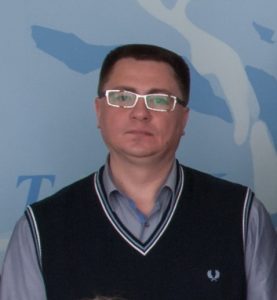 A.N. Starovoitov has been working at the Pacific Research Institute of Fisheries and Oceanography (TINRO) since 1996. In 2002 he defended his Ph.D. thesis in marine biology of chum salmon with the award of the scientific degree – Ph.D.
A.N. Starovoitov has been working at the Pacific Research Institute of Fisheries and Oceanography (TINRO) since 1996. In 2002 he defended his Ph.D. thesis in marine biology of chum salmon with the award of the scientific degree – Ph.D.
To date, he has participated in more than 50 sea expeditions of which 25 – led as a chief.
A.N. Starovoitov independently and in collaboration with colleagues published more than 50 scientific papers in domestic and foreign periodicals.
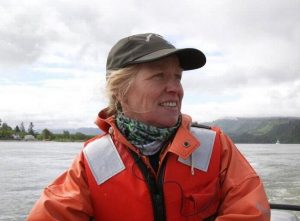 Dr. Laurie Weitkamp has focused on Pacific salmon conservation, research, and management since joining the Northwest Fisheries Science Center (USA) in 1992. Her research focuses on the ecology of Pacific salmon in estuarine and marine environments. She is particularly interested in how physical conditions influence biological processes that are important for salmon survival, including the impacts of climate change. On the management side, she serves on the Coho Technical Committee of the Pacific Salmon Commission. Laurie was a member of the scientific team on the 2019 Winter Expedition to the Gulf of Alaska and will be out again in winter 2022 on the NOAA ship, the Bell M. Shimada.
Dr. Laurie Weitkamp has focused on Pacific salmon conservation, research, and management since joining the Northwest Fisheries Science Center (USA) in 1992. Her research focuses on the ecology of Pacific salmon in estuarine and marine environments. She is particularly interested in how physical conditions influence biological processes that are important for salmon survival, including the impacts of climate change. On the management side, she serves on the Coho Technical Committee of the Pacific Salmon Commission. Laurie was a member of the scientific team on the 2019 Winter Expedition to the Gulf of Alaska and will be out again in winter 2022 on the NOAA ship, the Bell M. Shimada.
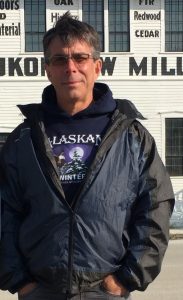 Dr. Ed Farley is the Program Manager for the Ecosystem Monitoring and Assessment (EMA) Program at the Alaska Fisheries Science Center, Auke Bay Laboratories in Juneau, Alaska, USA. The EMA program conducts integrated ecosystem research (oceanography to fish) in Alaska’s large marine ecosystems (Gulf of Alaska, Bering Sea, and Chukchi Sea) to examine the impact of climate change and variability on recruitment/survival of commercially important groundfish and salmon populations. Ed’s interest in fisheries began during the 1980s to 1990s, when he commercial fished for sockeye salmon in Bristol Bay. Since that time, Ed completed a BS in Mathematics at the University of Washington and a MS and PhD in Fisheries from the University of Alaska Fairbanks. Ed’s current research examines how reductions in Arctic sea ice and associated changes in the physical environment influence the flow of energy through the ecosystem in the northern Bering and Chukchi Seas.
Dr. Ed Farley is the Program Manager for the Ecosystem Monitoring and Assessment (EMA) Program at the Alaska Fisheries Science Center, Auke Bay Laboratories in Juneau, Alaska, USA. The EMA program conducts integrated ecosystem research (oceanography to fish) in Alaska’s large marine ecosystems (Gulf of Alaska, Bering Sea, and Chukchi Sea) to examine the impact of climate change and variability on recruitment/survival of commercially important groundfish and salmon populations. Ed’s interest in fisheries began during the 1980s to 1990s, when he commercial fished for sockeye salmon in Bristol Bay. Since that time, Ed completed a BS in Mathematics at the University of Washington and a MS and PhD in Fisheries from the University of Alaska Fairbanks. Ed’s current research examines how reductions in Arctic sea ice and associated changes in the physical environment influence the flow of energy through the ecosystem in the northern Bering and Chukchi Seas.
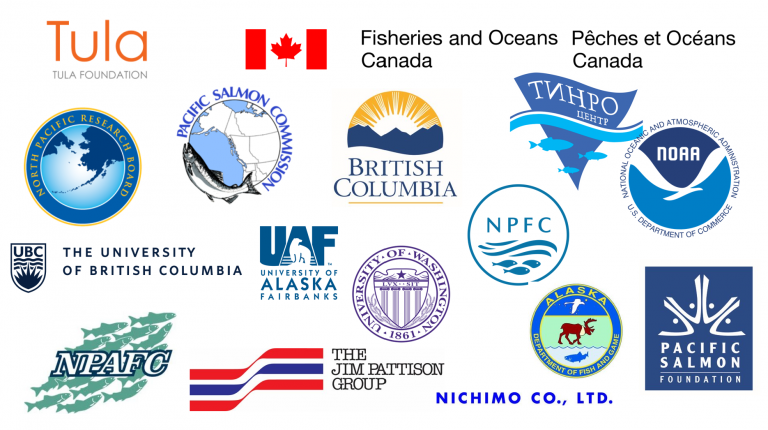
Live Vessel Tracking Map


